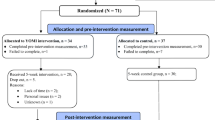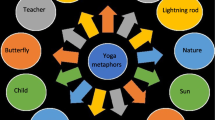Abstract
A growing body of evidence suggests that meditation-based mental practices cause desirable changes to the psychological status. Little is known how enduring changes to multiple aspects of emotions are observed for Japanese long-term practitioners. The present study using a cross-sectional design investigated mindfulness and relevant psychological functions in a population of Japanese yoga practitioners, who routinely practiced classical hatha yoga, breathing techniques, as well as focused attention-based meditation. Training period ranged from 0.3 to 34.0 years. Participants completed a battery of five established Japanese versions of questionnaires, each of which concerned mindfulness, subjective well-being, depression, positive/negative affect, and empathy. Compared with age- and sex-matched control participants, yoga practitioners self-reported significantly higher scores on mindfulness, well-being, positive affect, and empathy, and lower scores on depression and negative affect. Among the practitioners, period and amount of yoga/meditation practice, regardless of ages, predicted higher scores on mindfulness and well-being and lower scores on depression, negative affect, and empathy. These data overall suggest desirable psychological status associated with continued yoga practice among Japanese contemplatives. Implications for comparisons with different cultures and with other traditional practices are discussed.
Similar content being viewed by others
References
Baer, R. A., Smith, G. T., Hopkins, J., Krietemeyer, J., & Toney, L. (2006). Using self-report assessment methods to explore facets of mindfulness. Assessment, 13, 27–45.
Baer, R. A., Smith, G. T., Lykins, E., Button, D., Krietemeyer, J., Sauer, S., et al. (2008). Construct validity of the five facet mindfulness questionnaire in meditating and nonmeditating samples. Assessment, 15, 329–342.
Beck, A. T., Ward, C. H., Mendelson, M., Mock, J. E., & Erbaugh, J. K. (1961). An inventory for measuring depression. Archives of General Psychiatry, 4, 561–571.
Beck, A. T., Rush, A. J., Shaw, B. F., & Emery, G. (1979). Cognitive therapy of depression. New York: The Guilford Press.
Bijlani, R. L., Vempati, R. P., Yadav, R. K., Ray, R. B., Gupta, V., Sharma, R., et al. (2005). A brief but comprehensive lifestyle education program based on yoga reduces risk factors for cardiovascular disease and diabetes mellitus. Journal of Alternative and Complementary Medicine, 11, 267–274.
Cahn, B. R., & Polish, J. (2006). Meditation states and traits: EEG, ERP, and neuroimaging studies. Psychological Bulletin, 132, 180–211.
Carmody, J., & Baer, R. A. (2008). Relationships between mindfulness practice and levels of mindfulness, medical and psychological symptoms and well-being in a mindfulness-based stress reduction program. Journal of Behavioral Medicine, 31, 23–33.
Carson, J. W., Carson, K. M., Gil, K. M., & Baucom, D. H. (2004). Mindfulness-based relationship enhancement. Behavior Therapy, 35, 471–494.
Csikszentmihalyi, M. (1990). Flow: The psychology of optimal experience. New York: Harper & Row Publishers, Inc.
Davidson, R. J. (2003). Affective neuroscience and psychophysiology: Toward a synthesis. Psychophysiology, 40, 655–665.
Davis, M. H. (1983). Measuring individual differences in empathy: evidence for a multidimensional approach. Journal of Personality and Social Psychology, 44, 113–126.
Decety, J., & Lamm, C. (2006). Human empathy through the lens of social neuroscience. The Scientific World Journal, 6, 1146–1163.
Ferrarelli, F., Smith, R., Dentico, D., Riedner, B. A., Zennig, C., Benca, R. M., et al. (2013). Experienced mindfulness meditators exhibit higher parietal-occipital EEG gamma activity during NREM sleep. PLoS ONE, 8, e73417. doi:10.1371/journal.pone.0073417.
Field, T. (2011). Yoga clinical research review. Complementary Therapies in Clinical Practice, 17, 1–8.
Field, T., Diego, M., & Hemandez-Reif, M. (2010). Tai chi/yoga effects on anxiety, heart-rate, EEG and math computations. Complementary Therapies in Clinical Practice, 16, 235–238.
Finger, A., & Bingham, A. (2000). Yoga Zone introduction to yoga: a beginner’s guide to health, fitness, and relaxation. New York: Clarkson Potter.
Gupta, N., Khera, S., Vempati, R. P., Sharma, R., & Bijlani, R. L. (2006). Effect of yoga based lifestyle intervention on state and trait anxiety. Indian Journal of Physiology and Pharmacology, 50, 41–47.
Hayashi, K. (1988). Study on depressive states of students based on Beck’s cognitive therapy. Student Counseling Journal, 9, 97–107 (in Japanese).
Hayashi, K., & Takimoto, T. (1991). An examination of Beck Depression Inventory (1978) and an analysis of relation between depressive tendencies and grade of self-efficacy. Memoires of Shiraumegakuen College, 27, 43–52 (in Japanese).
Ito, M. (2011). A history of modern postural yoga in relation to contemporary spirituality culture. Journal of Religious Studies, 84, 1255–1256 (in Japanese).
Ito, Y., Sagara, J., Ikeda, M., & Kawaura, Y. (2003). Reliability and validity of subjective well-being scale. The Japanese Journal of Psychology, 74, 276–281 (in Japanese).
John, P. J., Sharma, N., Sharma, C. M., & Kankane, A. (2007). Effectiveness of yoga therapy in the treatment of migraine without aura. A randomized controlled trial. Headache: The Journal of Head and Face Pain, 47, 654–661.
Kabat-Zinn, J. (1982). An out-patient program in behavioral medicine for chronic pain patients based on the practice mindfulness meditation: theoretical considerations and preliminary results. General Hospital Psychiatry, 4, 33–47.
Kabat-Zinn, J. (1990). Full catastrophe living: using the wisdom of your body and mind to face stress, pain and illness. New York: Delacorte.
Kaiya, H., & Kumano, H. (2007). Mindfulness, meiso, zazen no no-kagaku to seishin-ryoho (Brain science and psychotherapy of mindfulness, meditation, and zazen). Tokyo: Shinkoh-igaku Shuppan-sha (in Japanese).
Kato, H. (1997). Psychological studies on Eastern tradition. Journal of the Faculty of Letters of the Komazawa University, 55, A1–A22 (in Japanese).
Khalsa, S. B. (2004). Treatment of chronic insomnia with yoga: a preliminary study with sleep-wake diaries. Applied Psychophysiology and Biofeedback, 29, 269–278.
Kubo, K., Okanoya, K., & Kawai, N. (2012). Apology isn’t good enough: an apology suppresses an approach motivation but not the physiological and psychological anger. PLoS ONE, 7, e33006. doi:10.1371/journal.pone.0033006.
Lazar, S. W., Kerr, C. E., Wasserman, R. H., Gray, J. R., Greve, D. N., Treadway, M. T., et al. (2005). Meditation experience is associated with increased cortical thickness. Neuroreport, 28, 1893–1897.
Lutz, A., Greischar, L., Rawlings, N. B., Ricard, M., & Davidson, R. J. (2004). Long-term meditators self-induce high-amplitude synchrony during mental practice. Proceedings of the National Academy of Sciences, 101, 16369–16373.
Lutz, A., Brefczynski-Lewis, J. A., Johnstone, T., & Davidson, R. J. (2008). Regulation of the neural circuitry of emotion by compassion meditation: effects of meditative expertise. PLoS ONE, 3, e1897. doi:10.1371/journal.pone.0001897.
Lutz, A., Greischar, L. L., Perlman, D., & Davidson, R. J. (2009a). BOLD signal in insula is differentially related to cardiac function during compassion meditation in experts vs. novices. NeuroImage, 47, 1038–1046.
Lutz, A., Slagter, H. A., Rawlings, N. B., Francis, A. D., Greischar, L. L., & Davidson, R. J. (2009b). Mental training enhances attentional stability: neural and behavioral evidence. The Journal of Neuroscience, 29, 13418–13427.
Lutz, A., McFarlin, D. R., Perlman, D. M., Salomons, T. V., & Davidson, R. J. (2013). Altered anterior insula activation during anticipation and experience of painful stimuli in expert meditators. NeuroImage, 64, 538–546.
Madanmohan, U. K., Bhavanani, A. B., Shatapathy, C. C., & Sahari, A. (2004). Modulation of cardiovascular response to exercise by yoga training. Indian Journal of Physiology and Pharmacology, 48, 461–465.
Michalsen, A., Grossman, P., Acil, A., Langhorst, J., Lüdtke, R., Esch, T., et al. (2005). Rapid stress reduction and anxiolysis among distressed women as a consequence of a three-month intensive yoga program. Medical Science Monitor, 11, 555–561.
Nagashima, Y. (2012). From “fitness” to “retreat”—a cultural history of contemporary yoga—dissertation, Waseda University (in Japanese).
Orlick, T. (1990). In pursuit of excellence. Champaign: Human Kinetics.
Sakurai, S. (1988). The relationship between empathy and helping behavior in college students. Bulletin of Nara University of Education, Cultural and Social Science, 37, 149–154 (in Japanese).
Sato, T., & Yasuda, A. (2001). Development of the Japanese version of positive and negative affect schedule (PANAS) scales. The Japanese Journal of Personality, 9, 138–139 (in Japanese).
Segal, Z. V., Williams, J. M. G., & Teasdale, J. D. (2002). Mindfulness-based cognitive therapy for depression: a new approach to preventing relapse. New York: Guilford.
Sell, H., & Nagpal, R. (1992). Assessment of subjective well-being: The subjective well-being inventory (SUBI). New Delhi: Regional Office for South-East Asia, World Health Organization.
Shapiro, S. L., Schwartz, G. E., & Santerre, C. (2002). Meditation and positive psychology. In C. R. Snyder & S. J. Lopez (Eds.), Handbook of positive psychology. New York: Oxford University Press.
Shapiro, S. L., Brown, K. W., & Biegel, G. M. (2007). Teaching self-care to caregivers: effects of mindfulness-based stress reduction on the mental health of therapists in training. Training and Education in Professional Psychology, 1, 105–115.
Sharma, R., Gupta, N., & Bijlani, R. L. (2008). Effect of yoga based lifestyle intervention on subjective well-being. Indian Journal of Physiology and Pharmacology, 52, 123–131.
Sherman, K. J., Cherkin, D. C., Erro, J., Miglioretti, D. L., & Deyo, R. A. (2005). Comparing yoga, exercise, and a self-care book for chronic low back pain: a randomized, controlled trial. Annuals of Internal Medicine, 143, 849–856.
Slagter, H. A., Davidson, R.J., & Lutz, A. (2011). Mental training as a tool in the neuroscientific study of brain and cognitive plasticity. Frontiers in Human Neuroscience, 5(17). doi: 10.3389/fnhum.2011.00017
Sugiura, Y., Sato, A., Ito, Y., & Murakami, H. (2012). Development and validation of the Japanese version of the Five Facet Mindfulness Questionnaire. Mindfulness, 3, 85–94.
Tonan, K., Sonoda, A., & Ono, Y. (1995). Production of the subjective well-being inventory Japanese edition: its reliability and validity. Japanese Journal of Health Psychology, 8, 12–19 (in Japanese).
Uchida, Y. (2013). Well-being and better life index by Japanese. Psychology World, 60, 5–8 (in Japanese).
Uchida, Y., & Kitayama, S. (2009). Happiness and unhappiness in East and West: themes and variations. Emotion, 9, 441–456.
Uebelacker, L. A., Tremont, G., Epstein-Lubow, G., Gaudiano, B. A., Gillette, T., Kalibatseva, Z., et al. (2010). Open trial of Vinyasa yoga for persistently depressed individuals: evidence of feasibility and acceptability. Behavior Modification, 34, 247–264.
Walters, J. D., & Kriyananda, S. (2011). The art and science of raja yoga: a guide to self-realization. Nevada City: Crystal Clarity Publishers.
Watson, D., Clark, L. A., & Tellegen, A. (1988). Development and validation of brief measures of positive and negative affect: the PANAS scales. Journal of Personality and Social Psychology, 54, 1063–1070.
Weng, H. Y., Fox, A. S., Shackman, A. J., Stodola, D. E., Caldwell, J. Z. K., Olson, M. C., et al. (2013). Compassion training alters altruism and neural responses to suffering. Psychological Science, 24, 1171–1180.
Acknowledgments
This study was supported by the funding from the Japan Science and Technology Agency, Exploratory Research for Advanced Technology, Okanoya Emotional Information Project. The authors thank Masaharu Naruse, Hisami Sakurai, and Yoko Cashell for their assistance in recruiting the participants.
Conflict of Interest
The authors declare that they have no conflict of interest.
Author information
Authors and Affiliations
Corresponding author
Rights and permissions
About this article
Cite this article
Miyata, H., Okanoya, K. & Kawai, N. Mindfulness and Psychological Status of Japanese Yoga Practitioners: a Cross-Sectional Study. Mindfulness 6, 560–571 (2015). https://doi.org/10.1007/s12671-014-0288-0
Published:
Issue Date:
DOI: https://doi.org/10.1007/s12671-014-0288-0




